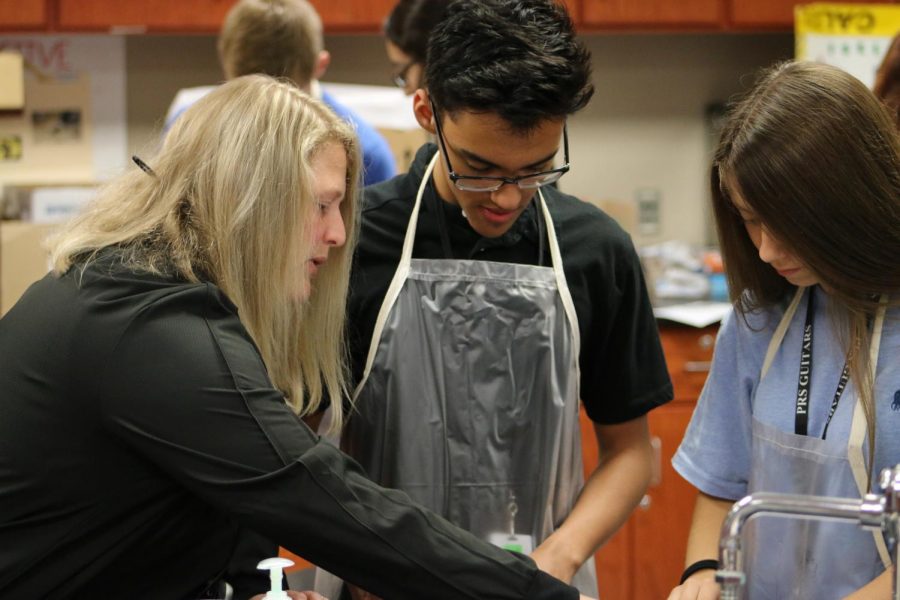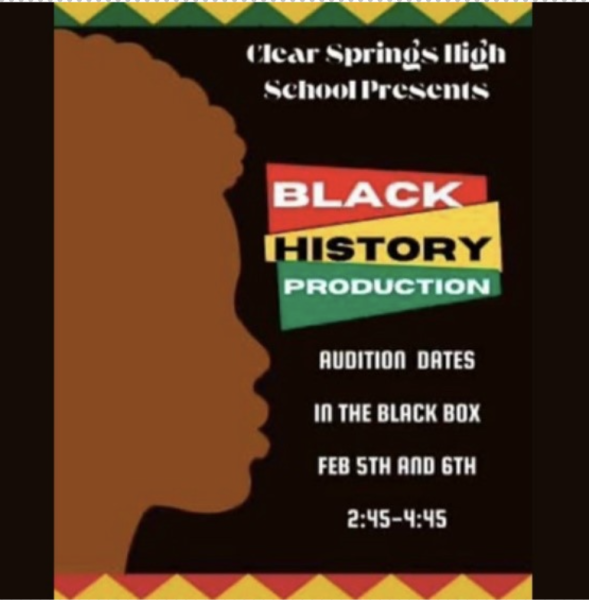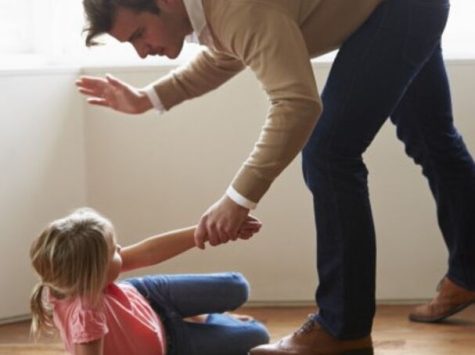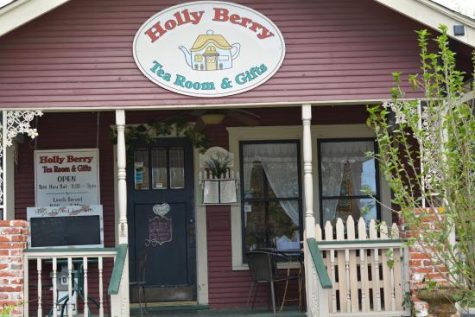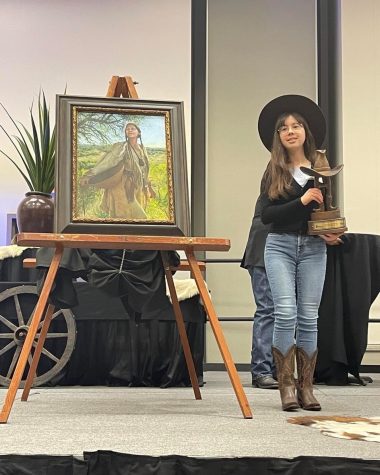Family and Forensics with Mrs. Farrington
Farrington and forensics’ students working on a powder fingerprint lab.
November 2, 2018
Some teachers’ lessons go beyond classroom walls, such is the case for Mrs. Alexandra Farrington. She teaches forensic science, the study of the investigations surrounding criminal cases.
“I got into forensics because I’ve always enjoyed many different fields of science. Forensics was a great way to merge biology, chemistry, and physics, and all those parts that were my favorite in each one, into one subject,” Farrington said.
Forensics is a scientific field, unlike any other. It encompasses almost every other field of science, featuring professions such as forensic engineering, toxicology, forensic biology, and digital analysis amongst other fields. Overwhelmed by the many fields of forensics, as well as her many interests, Farrington had trouble deciding the exact career path she was going to pursue in college.
“I always knew I would end up in a science field. Now, I [still] changed my major many times. There was a time when I was going to do forensic anthropology because I was really interested in not only the crime investigation, but bones, which was super interesting to me because you can tell a lot from a person’s bones,” Farrington said. “It’s fascinating beyond belief.”
Farrington graduated from Texas Tech university.
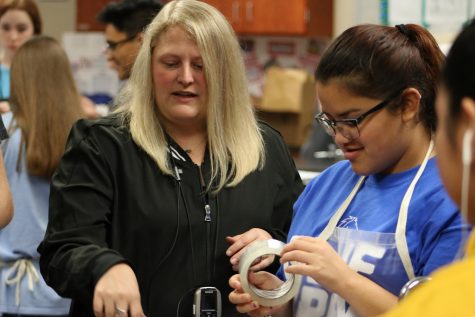
Farrington helping student with lab.
“I will be honest; Tech doesn’t have the strongest programs in forensic science. I went there more for the medical side of forensic anthropology, and they’re a good school for that study,” Farrington said.
Farrington’s decision to pursue teaching, rather than forensics, was one that came unplanned.
“I took an education class as one of [my] random electives. Weirdly enough, the professor really liked me, and encouraged me to get my teaching certificate, instead of just the science background,” Farrington said. “There is always a need for science teachers.”
Farrington graduated in December, though. Being the middle of the school year, it was an odd time for teachers to find jobs. Finding a job seemed like it was going to be a hard task, but after attending a job fair hosted at Texas Tech, Farrington discovered a position for a science teacher at Clear Springs.
“I honestly didn’t even know where League City was. I had to go look it up on a map after I heard about the opening at Clear Springs. They were very interested in me and needed science teachers. I had to take whatever I could get. My husband and I needed an income so I had to take the first job I could get,” Farrington said.
Farrington, despite her background in forensics, and her desire to pursue a career in it, began teaching IPC and chemistry.
“Other people had taught forensics before I did. My name somehow came up, and I started randomly teaching the elective class. The first year I was like – really, I have to teach this class,” Farrington said. “But, I really did fall in love with forensics.”
The class took a few years to gain some traction, but soon, the school had to make extra sections to accommodate the many students wanting to take forensics. Now, the class is an elective science that many look forward to taking their junior and senior year.
“With high school kids, it’s more of an interactive environment which I really love. They learn and engage with one another, and I like that. Especially, students that can learn the material and can discuss,” Farrington said.
The class centers around learning the skills required to examine a criminal case. In the class, you learn to record evidence, take fingerprints, sketch crime scenes, and many more skills. The class also features another important aspect to criminal investigation: discussion.
“I think the conversational aspect is one of my favorite parts of what I do. Students may even be interested in books that I’ve read that deal with the topics and are very well written with scientific backing,,” Farrington said.
When not at school, Farrington loves spending time with her family.
“I’m pretty basic. My family takes up a lot of my time. I am one of those very simple people where simple things make me happy,” Farrington said.
Farrington also has a young son, and outside of her classroom, he becomes her life.
“I’ve been really enjoying my time with my son since he’s little and wants to be around me, enjoy my company and have little conversations with me. His conversations are hilarious. They’re still kind of broken English, but I can get what he’s saying,” Farrington said.
Family aside, forensic science began as a probable career, then a classroom subject. However, there is a huge difference between teaching something and pursing an active career in it.
“Saying I was to transition from the classroom to the field is a big statement. I don’t know if I ever would. I guess the idea is always there,” Farrington said.
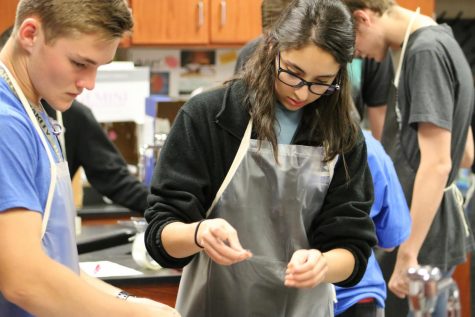
Farrington helping student with lab.
Farrington, with some educational as well as scientific background, could easily make the transition.
“I’ll be honest, I would love to have real field experience. As I’m getting a little bit older, expanding my knowledge and meeting a lot of people who are professionals in the field, I would like to have that opportunity,” Farrington said.
While in the classroom, you teach skills that can be applied to the field. In comparison, those working in the field experience the evil-doings that one human can commit against another.
“I know now that I could cope with it in a healthy way. That’s a big issue in this field: learning how to cope with things versus employing unhealthy coping mechanisms. It’s not a sun-shiny day where you come home and see your family, but think about families who are now missing their loved ones, or children,” Farrington said.
The emotional impact and baggage that comes when dealing with such nasty human behavior is a major aspect of numerous forensic careers.
“It can be grueling and tolling and I think that’s why some people spend a very short time in the field because of the emotional aspect, but I would hope that through learning and maturing, I would actually do well in the field,” Farrington said.
Farrington always seeks out an opportunity to expand her forensic knowledge. She may be a teacher, but she is always willing to learn and grow.
“I am always looking for more trainings to go to. I’m getting to go to another one this summer. We’re doing a training on the body farms at Texas State,” Farrington said. “It’s a great hands-on experience, especially if you’re going into the field. You’re working with real bodies and real studies on recovery of remains and stuff like that.”
Though, the closeness with death, and the effects on its victims, can have an impact.
“Unfortunately, some of the stories that come to my mind so quickly, are the stories where the parents never see their kids again; the darker stories,” Farrington said.
As a mother, these stories have caused fear in Farrington’s mind.
“I might become paranoid like my mom was as a nurse, and I might be that weird mom who overthinks everything. If my son goes out in the front yard, and disappears for even a minute… sometimes my heart does stop,” Farrington said.
Teaching Forensic science, and understanding the tools that are used to investigate a crime scene involve a deep understanding of crime, and thus, in turn, a large amount of case study. Once you are made aware of something that has happened to real people in the past, it becomes very easy to imagine those you know in the same situations.
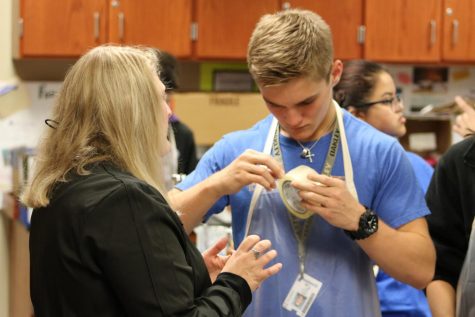
Farrington helping student with lab.
“I know how fast things happen sometimes. Those things have happened in the past- a kid is there, and in the blink of an eye he’s not. Anything crowded, you’re holding your kids hand, and then you’re not holding your kids hand- I seriously went into a meltdown one time- and they’re just gone,” Farrington said.
These grim thoughts, despite seeming gruesome and wrong, have extended beyond a simple worry. Being constantly surrounded, has caused Farrington to extend her imagining beyond the simple scenario.
“This might sound awful, but I more hope that my loved one is probably dead than going through things that I’ve heard people go through,” Farrington said.
Farrington’s connection also extends to the students she teaches. Teaching students for an entire year and becoming involved in their personal lives by force can be an emotionally draining task, but one that is worthwhile.
“Teaching brings in an emotional element. I end up learning a lot of background information on some of my students. Some of it is negative, dealing with the criminal justice system,” Farrington said.
Farrington has also seen how these experiences have affected her students.
“You can’t let the experience stop you. Never let the things that happen to you stop you. You are giving someone else, or something that was done to you the power to have a hold on you. It’s nice to see those people who have also come through the criminal justice system, and they learned how to move on and grow in a positive way,” Farrington said.
Farrington turns the negative experiences into a lesson for all of her students.
“I’ve always told young ladies and gentlemen to be aware of your surroundings: don’t park your cars in a dark, faraway place if you’re going to be out at night and have to walk. Don’t have your earbuds in; you have to be present. I think that’s something that we should all learn,” Farrington said.
Living in the society we do is hard, learning how to deal with its evils and prevail over them is unimaginably difficult; but, it’s a part of life.
“Bad things will always happen, no matter what time period you’re in. Now, we have technology and tools that can aid us in investigations, and we can change things and do a better job of bringing justice to the world,” Farrington said.
Farrington, despite her fears, will strive to always overcome them.
“It can’t ever stop you, and I’m never going to let it stop me,” Farrington said. “I would never let the evil win, and I want the good to prevail.”

